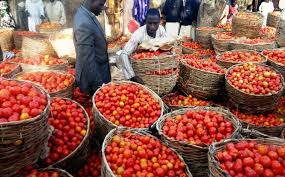High prices have driven fresh tomatoes beyond the reach of the average citizen, and households have been compelled to get experimental in their quest for cost-effective substitutes to their beloved tomato stew used to enjoy a meal of rice, one of the most consumed staple foods in Nigeria.
Nigerians enjoy rice in a variety of ways, but jollof rice, considered to be the country’s national dish, is the preferred rice meal for most. Rice with tomato stew likely takes the second position. However, households are being forced to find alternatives in the face of high cost of fresh tomato, a major ingredient for both meals.
In markets across many of Nigeria’s cities, fresh tomatoes sell for as high as N1,000 for three or four medium-sized fruits.
“I bought 10 tomatoes for N2,500 just last week,” Chichi Ofong, a Lagos resident, told The Nigerian Observer.
In May, a tomato seller at Mile 12 International Market in Lagos, Umar Tanko, told Nairametrics that a basket of premium quality fresh tomatoes, which was sold for between N50,000 and N80,000 in April, went for between N140,000 and N150,000 as at May. Similarly, lower-quality tomatoes damaged during the journey from the North to the South sold for around N60,000 to N100,000 in May, as against N30,000 in April 2024.
As the price of tomatoes continues to soar, many households are turning to long-abandoned recipes or trying out new recipes all in the bid to make nutritious sauces for their rice without relying too much on tomatoes.
“I can’t even remember the last time we had fresh tomatoes in my house. Tatashe, shombo, other varieties of pepper with onions make a mean stew. It’s so much tastier than tomato stew,” said an Abuja resident who does not want to be named.
Mrs. Ngozi Osahor, who shares her time between Nigeria and Ghana, said her favourite recipe is plenty onions, lots of chilli pepper and sachet tomatoes.
“I don’t parboil my meat. I just blend the shombo and onions, pour it into the hot oil, put the beef in, then let it cook for a long while till it comes together nicely,” she said.
Mrs. Odion Edokpayi, a trader at New Benin Market in Benin City, Edo State, said she eats her rice with only vegetable sauce these days.
“Although vegetables are also expensive, they are still more affordable than tomatoes right now. I use a mix of leafy greens like spinach and ugu (pumpkin leaves), along with green leaves, the one Yoruba people call ‘Ishoko’. These vegetables are versatile and can make a tasty sauce, even though they can be pricey too,” she said.
She said many of her friends and neighbours she has spoken to are also making similar changes.
“Some have switched to using dried or canned tomatoes sparingly, and others are trying different types of sauces and soups. Everyone is looking for ways to manage within their means,” Mrs. Edokpayi said.
On the taste and variety of vegetable sauce compared to tomato stew, she said, “Vegetable sauce is quite different from tomato stew, but it’s a good alternative. It’s nutritious and can be very flavourful with the right spices. I do miss tomato stew, but this is a better option for now given the circumstances.”
A Benin resident who asked not to be named said she has embraced Banga soup.
“A De Rica of Banga (fresh palm fruits), priced at approximately N1,200, can produce a substantial pot of soup. This makes it a more economical option compared to tomatoes as even N5,000 worth of tomatoes may not cook enough stew for a family of five to enjoy a meal of rice,” she said.
Other alternatives people are adopting include garden egg sauce, egg stew (a simple yet delicious mixture of eggs and tomato paste), while some have added carrots and cucumber into the mix.
Prices of goods and services have been spiking since May last year when the Bola Tinubu Presidency yanked the subsidy on petrol and left the exchange rate at the mercy of market forces. Naira, the local currency, has been on a free fall against international currencies, and inflation has maintained an upward trend, reaching 33.95 per cent in May 2024, from 33.69 per cent recorded in April, driven by higher food and transport prices, according to the National Bureau of Statistics (NBS). Food inflation rose to 40.66 per cent in May, from 40.3 per cent in April.
SBM Intelligence, in an April 2024 report “The SBM Jollof Index: Crisis at the table”, blamed the rising food prices on the effect of the naira devaluation as well as other long-standing issues, such as conflicts in food-producing regions, reduced arable land, climate variability, increased energy costs, and restrictions on foreign exchange for specific food items.
On Monday, Chairman of the Mile 12 International Market, Shehu Usman Jubrin, pinned the high cost of tomato, pepper and other perishable items on insecurity in the North, supply shortages, and pests and diseases.
“Ninety-nine per cent of the people in IDP camps are farmers. They don’t know anything apart from farming – both male and female. The people who are on the farm and are farming with one eye closed are just about 1,500 out of like 5,000 farmers we have across the whole country,” he said on Channels Television’s “The Morning Brief”.
Jubrin said in those places, some of the farmers negotiate with and pay bandits before they can go to their farms to harvest the produce.
He also blamed supply shortage from the North to the South, saying tomatoes from the North are available from November, December, January, February, March, and April, up to May.
“This is the off-season now, so we expect tomatoes from Ilaro, Ogbomosho, Abeokuta, and Osun to come to Lagos, you know, and also part of Cameroon. That is a kind of substitute for the northern one,” Jubrin said.
“But unfortunately, it’s late: the one from Cameroon, the one from Abeokuta and Ogbomosho. And as we approach the festive period, tomatoes will be expensive. The northern tomatoes are finished and we don’t have substitutes from the south,” he said.
Echoing similar sentiments, a tomato seller in New Benin Market in Benin City, Mrs. Grace Otasowie, said the major reason for the high cost was that “it’s not the season for tomatoes”.
“When it’s not their season, tomatoes become scarce. Additionally, the majority of tomato farming is done in the Northern region. Our people here in Edo State are not engaging in tomato farming as much, which also contributes to the scarcity and high prices,” Mrs. Otasowie said.
“During the off-season, the supply decreases, and since we rely heavily on tomatoes from the North, any disruption there affects the prices here. If more people in Edo State engaged in tomato farming, it could help stabilize the prices,” she said.
However, Mrs. Juliet Chukwumeka, a trader in the same market, blamed the numerous unions operating within the market for the hike in prices of food items and other commodities.
“These unions often have their own fees and regulations, which can drive up the prices of goods, including tomatoes. The unions impose various charges on traders, which in turn increases our overall costs. To cover these costs, we have to raise the prices of the goods we sell. This affects not only tomatoes but many other products in the market,” she said.
She urged the state government to set up a regulatory body to control the prices of goods in the market, saying a regulatory body could help ensure fair pricing and reduce the undue influence of unions.


